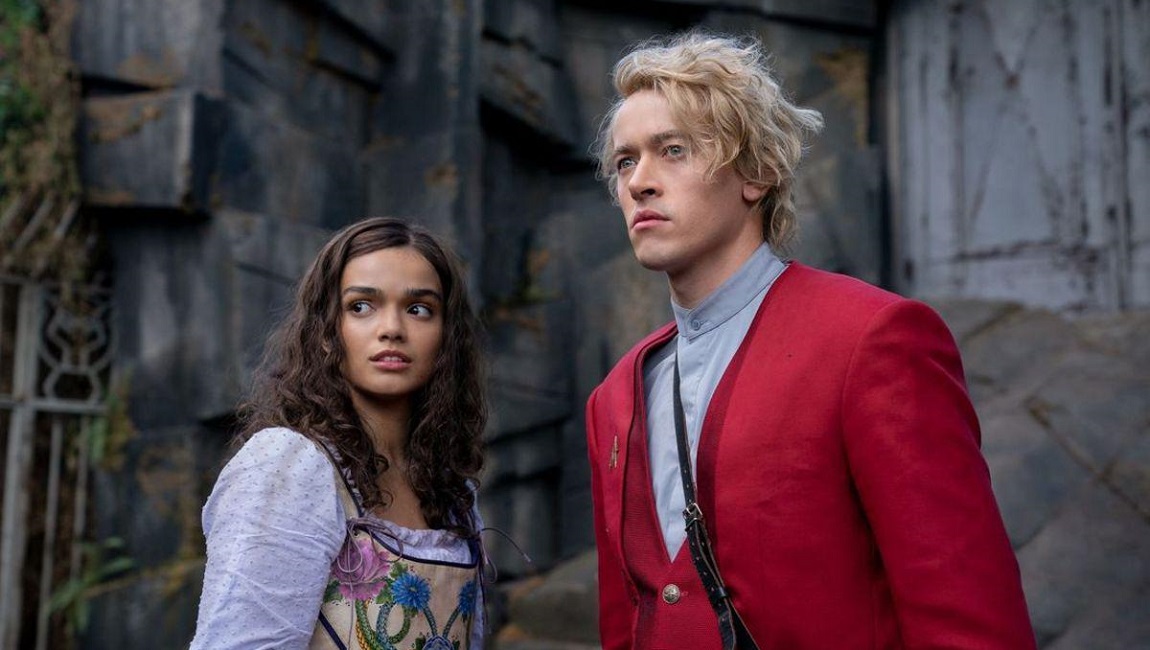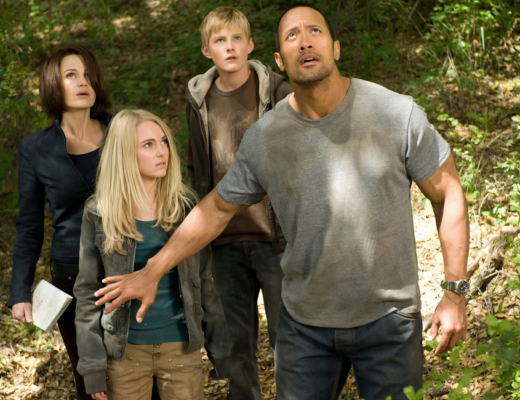The art of adaptation precludes mere transcription, most particularly where the written word is translated to a visual medium like film. Nowhere is the canvas for this art more vast than in the realm of genre cinema, where the rules of reality hold no sway and imaginative faculties are the weapon of choice. To take this a step further, one could argue that young adult properties of the fantasy, dystopian, et al., persuasion represent the grandest possibility for meaningful adaptation, their clean surfaces only barely shaded in with assorted tropes, prefab narrative frameworks, and graphene-thin themes begging to be imbued with psychological acuity, meaningfully interrogated socio-historicity, and slathered in aesthetic spectacle. Of course, cinematic history tells what a tall order this is, with franchise after franchise consistently faceplanting, leaving only littered, qualified praise. Take, for example, the Harry Potter franchise, where proven milquetoast director David Yates managed to produce the series’ best stretch with Half-Blood Prince and especially Deathly Hallows: Part 1, foregoing dogged deference to She-Who-Must-Not-Be-Named’s source material and introducing atextual narrative fillips, a thornier emotional register, and a visual schema that was both in discordant conversation with and entirely superior to the earlier franchise entries. Then there’s the inaugural Twilight film, an arguable camp masterpiece and one of the only films of the YA heyday that bore any genuine personality, even if it was of the entirely daffy variety. But these wins are outliers in a factory line of mostly anonymous studio junk that subsists only on narrative recitation, and the question then becomes whether fandom demand — and the resulting fiscal implications — for perversely faithful adaptations leads to boobish, fill-in-the-blank bunk or if directors are purposely chosen for their technically competent but bland malleability, with screenwriters only needing to pass basic literacy tests to qualify for the job.
In either case, odds or author, The Hunger Games’ recent revival The Ballad of Songbirds and Snakes never really stood much of a chance. Returning is proven director of vanilla blockbusters, Francis Lawrence, who helmed 75% of the Hunger Games series, which was, of the many YA franchises of the late-aughts to mid-tens, among the worst of the blotted bunch. Sure, there were nonstarters like City of Bones, I Am Number Four, and Beautiful Creatures, and the silly soap operatics of the appealingly unhinged Divergent series didn’t even usher that franchise to its final film. But The Hunger Games existed in a different echelon of prestige YA fare in those days, and even by that basement-level metric, the film franchise failed to sustain sufficient energy, particularly in its enervating final film. Plenty of this had to do with author Suzanne Collins’ source material, which miscalculated the appeal of a moody heroine and king beta love interest, and so weighed down every interesting idea — the first Mockingjay’s engagement with the propaganda machine that is part and parcel to all war, for instance. But the author clearly didn’t learn her lesson, as the decade-later publication of Ballad of Songbirds & Snakes was a spectacularly misjudged resurrection, centering the original tetralogy’s primary villain, President Coriolanus Snow, within a sympathetic origin story that nobody asked for.
Newcomer Tom Blyth takes on the coveted role of future fascist in the film adaptation, and Snow is here far from the pampered psychopath we know. Instead, though he still resides in the capital, he’s a teenage orphan living in poverty with his grandma’am (Fionnula Flanagan) and cousin Tigris (Hunter Schafer) — it turns out the Rumpleteazer-looking revolutionary from the final Mockingjay film was actually family all along! His only hope to reestablish family wealth and glory is to earn the coveted Plinth prize awarded to the student with top marks so that he can afford university and rise up the social and political ranks. But there’s a twist this year: rather than presenting the honor to the most academically successful student, the top 24 capital students will instead serve as mentors to the tributes for the 10th Annual Hunger Games, which have been flagging in popularity of late. The Games’ founder and noted drug addict, Dean Highbottom (Peter Dinklage), has orchestrated the pivot to encourage tributes to focus on entertaining viewers rather than focusing solely on winning. It’s an unexpected boon for Coriolanus — despite the implied sabotage on Highbottom’s part, who expressly hates the young Snow — when he is assigned to District 12’s female tribute (something in the water?), a sassy, singing rube with a Southern drawl named Lucy Gray Baird. After her name is called at the reaping and she responds by dropping a snake down a romantic rival’s blouse and performing a musical number, Coriolanus sees her potential to enthrall viewers, delivers a proposal to head gamemaker Dr. Gaul (Viola Davis) that will encourage viewers to invest in the tributes themselves rather than only their deaths, and, of course, begins to coach and, in effect, court his Hunger Games’ charge.
This description only establishes Songbirds and Snakes’ basic setup, and as these things go, there’s enough plot here to fill a few movies, none of it particularly novel or compelling. And therein lies the film’s most glaring problem: viewers have already seen these narrative machinations and limited themes leeched for every ounce of meaning across the original series, but here we are again, chewing on the exact same discursive material like a cow with their cud. Society is like the arena. Where have we heard that before? Attempts to distract from this sense of the familiar and to counter the deathly seriousness of earlier films mostly come by juicing the narrative’s periphery with a little arch frivolity; Jason Schwartzman’s magician/weatherman/Hunger Games host, for instance, lends a sense of the absurd with catchphrases like “That’s what happens when you do stuff.” Meanwhile, Davis’ Volumnia Gaul is rendered like a mad scientist cross of Gene Wilder’s doctor from Young Frankenstein and some anonymous Marvel villain, a pleasantly campy performance but one that’s incongruous to the star-crossed tragedy brewing at the film’s core. Speaking of: Blyth, for his part, is effective in his limited ask of fulfilling a character clearly written no more complexly than “has waterfall blue eyes,” while Zegler fares the best of the cast, imbuing a character conceived as a hippie-hayseed hybrid with both a too-young weariness and genuine sense of danger.
At least the film’s characters all skew toward compelling, however goofy it all is, because the Games’ action is atrociously rendered. There’s no kinetic energy to Lawrence’s direction, nor even any imagination; a pitchfork is responsible for what feels like half of the deaths here, and each killshot looks more bogus than the last. And while the more limited scope of the Hunger Games in Songbirds and Snakes — here in their infancy, taking place some 64 years before the original film — makes logical sense, it results in profoundly dull viewing without an inkling of invention, like a Saw prequel film where Jigsaw just shoots folks with a gun. But then the Games end with foreseen results, and the film makes the decision to stick to Collins’ original, utterly enervating structuring disaster of including a distended, post-Hunger Games third act. In fairness, it’s impossible for the central duo’s arc to resolve prior to this point, but the choice is absolutely fatal for momentum — the only pleasure to be found in this section is Blyth’s adoption of a Slim Shady aesthetic, adding a few extra points to his hunk score. The climax for Coriolanus and Lucy Gray that the film has been building toward is indeed effective in conception, but the entire rest of Collins’ narrative feels reverse-engineered from this punctuation mark, and the developments that lead us from part three’s opening to the film’s end are risible in how rushed everything feels. Up until the Songbirds and Snakes’ final few minutes, the villain origin story at its center feels thankfully measured and patient, if slicked with a lot of hokum. So when Coriolanus goes from conflicted and lovestruck, firmly planted in a moral and logistical gray area, to buzz-haired, white-T-shirted, dog tag-bedecked predator firing his automatic rifle indiscriminately in the air, all remaining drama is at last drained, the final 170° to supervillain achieved in a single moment. There may not be any other Hunger Games books to adapt to film at present, nor is there much to say about songbirds, but Ballad makes a strong case that this series has officially become a snake swallowing its own tail.
DIRECTOR: Francis Lawrence; CAST: Tom Blyth, Rachel Zegler, Peter Dinklage, Viola Davis, Jason Schwartzman; DISTRIBUTOR: Lionsgate; IN THEATERS: November 17; RUNTIME: 2 hr. 37 min.







